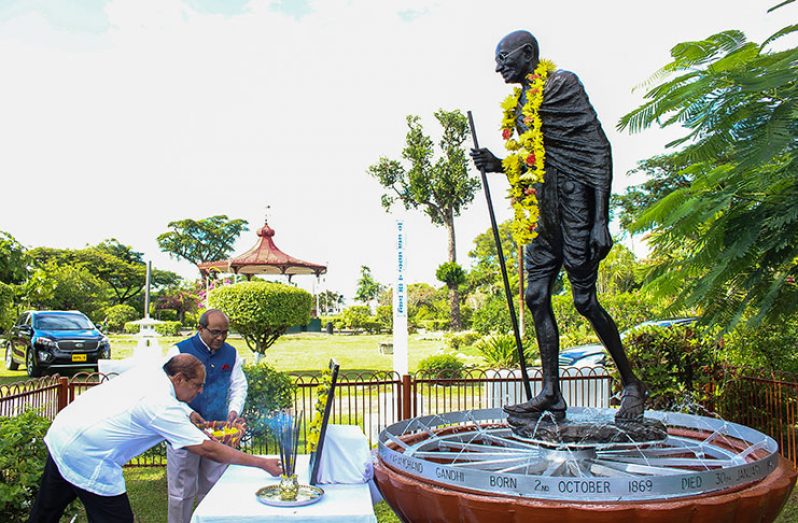–in face of extremism, as world celebrates Gandhi’s 148th birthday
PRIME Minister, Mr Moses Nagamootoo, said on Monday that the teachings of The Mahatma are now more important than ever, with all the ills plaguing the world today.
“We need his teachings now more than ever to address discrimination, which comes in the form of sexism, racism, ageism and so forth,” the PM said.
“His teachings need to be taken into consideration, especially when dealing with extremism, which continues to grow,” he told the sizeable gathering at the Promenade Gardens to celebrate Gandhi’s 148th birthday.
During the ceremony, which was organised by the Indian High Commission, many other distinguished persons besides the Prime Minister reflected on the work and life of Gandhi, whom the world has come to regard as the pioneer of non-violence and civil disobedience.
Born Mohandas Karamchand Gandhi on October 2, 1869 in present-day Gujarat, in western India, he was later to become known as “The Mahatma”, which in Sanscrit means “Venerable One”, and Gandhi ji.
The prime minister reminded his audience that although Gandhi died many years ago, his teachings are just as relevant as they were when he was alive.
India’s High Commissioner to Guyana, Mr V. Mahalingam, said Guyana has been doing a great job when it comes to following Gandhi’s path.
He gave as a fitting example the empowerment of women, which he said was one of the things The Mahatma had always advocated.
Gandhi was, however, remembered for many other things, such as being the leader of the Indian independence movement against British rule, and inspiring movements for civil rights and freedom across the world.
A graduate of London’s Inner Temple, Gandhi first employed non-violent civil disobedience as an expatriate lawyer in South Africa, in the resident Indian community’s struggle for civil rights.
After his return to India in 1915, he set about organising peasants, farmers, and urban labourers to protest against excessive land-taxes and discrimination.
Assuming leadership of the Indian National Congress in 1921, Gandhi led nationwide campaigns for various social causes and for achieving Swaraj or self-rule.
Research has revealed that Gandhi famously led Indians in challenging the British-imposed salt tax with the 400 km (250 mi) Dandi Salt March in 1930, and later in calling for the British to quit India in 1942. He was imprisoned for many years, upon many occasions, in both South Africa and India.
He lived modestly in a self-sufficient residential community, and wore the traditional Indian dhoti and shawl, woven with yarn hand-spun on a charkha.
He ate simple vegetarian foods, and also undertook long fasts as a means of both self-purification and political protest.











